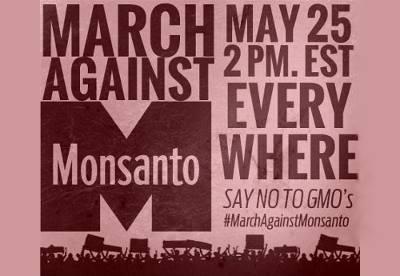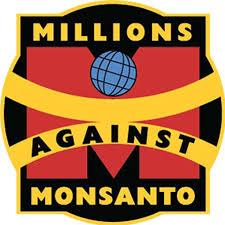
By Michele Henry, Toronto Star
They’re angry. They’re scared. And they want to know exactly what they’re putting in their mouths.
Local activists against genetically modified foods will take to the streets May 25, joining timed rallies across the globe, to draw attention to an industry they say is “poisoning people and the earth.”
Millions Against Monsanto Toronto and its supporters will march from St. James Park, near King and Jarvis Sts., to the St. Lawrence Market and back beginning at 2 p.m. on Saturday. Their aim, they say, is to press governments for clear labelling on foods that contain genetic modifications.
“We’re not going to quit until there’s change,” says Jennifer Berman Diaz, co-manager of the Millions Against Monsanto Toronto chapter, a year-old organization that began with nine members and has swelled to more than 2,000 supporters.
“We have the right to know what’s in our food and we want healthy food.”
Millions Against Monsanto began in the U.S. to fight Monsanto, the world’s leading producer of GMO seeds.

GMO foods are primarily fruit, vegetables and seeds with modifications to their DNA. Unlike hybrid produce, which is the product of cross-breeding species of flora, genetically modified organisms are manipulated at the molecular level and in the last few years have become a polarizing and hotly debated topic.
Research into whether or not these organisms are safe for human consumption is inconclusive at best.
But, says Berman, there have been several studies — on animals and insects — that raise concern. “Labelling would at least give us the choice — we could choose organic or look for another brand,” she says.
Millions Against Monsanto is calling on the food giant, which owns and patents 86 per cent of the world’s GMO seeds, to share information about the creation, research, chemicals and pesticides in genetically modified products.
Activists would also like to see an end to seed patents and a revamping of the Novel Foods Act, which governs GMO licensing in Canada.
GMO foods grown in Canada include sugar beets, corn, soy and canola. GMO foods imported into the country include papaya, yellow squash and zucchini, Berman says. Alfalfa, for primary use as animal feed, a type of salmon and a non-browning apple, are on the waiting list to join GMOs permitted in Canada, she says.
In an email to the Star, Trush Jordan, public and industry affairs director for Monsanto Canada Inc., said the company “has no statement or comment to share” at this time but will be able to provide a statement at the time of the march.
Berman says that more than 1,800 people have signed up to attend the rally. Rallies are expected in 36 countries, including Europe and Australia.
“It’s to create awareness,” she says, “of the harmful effects of GMOs on our health and the environment.”

